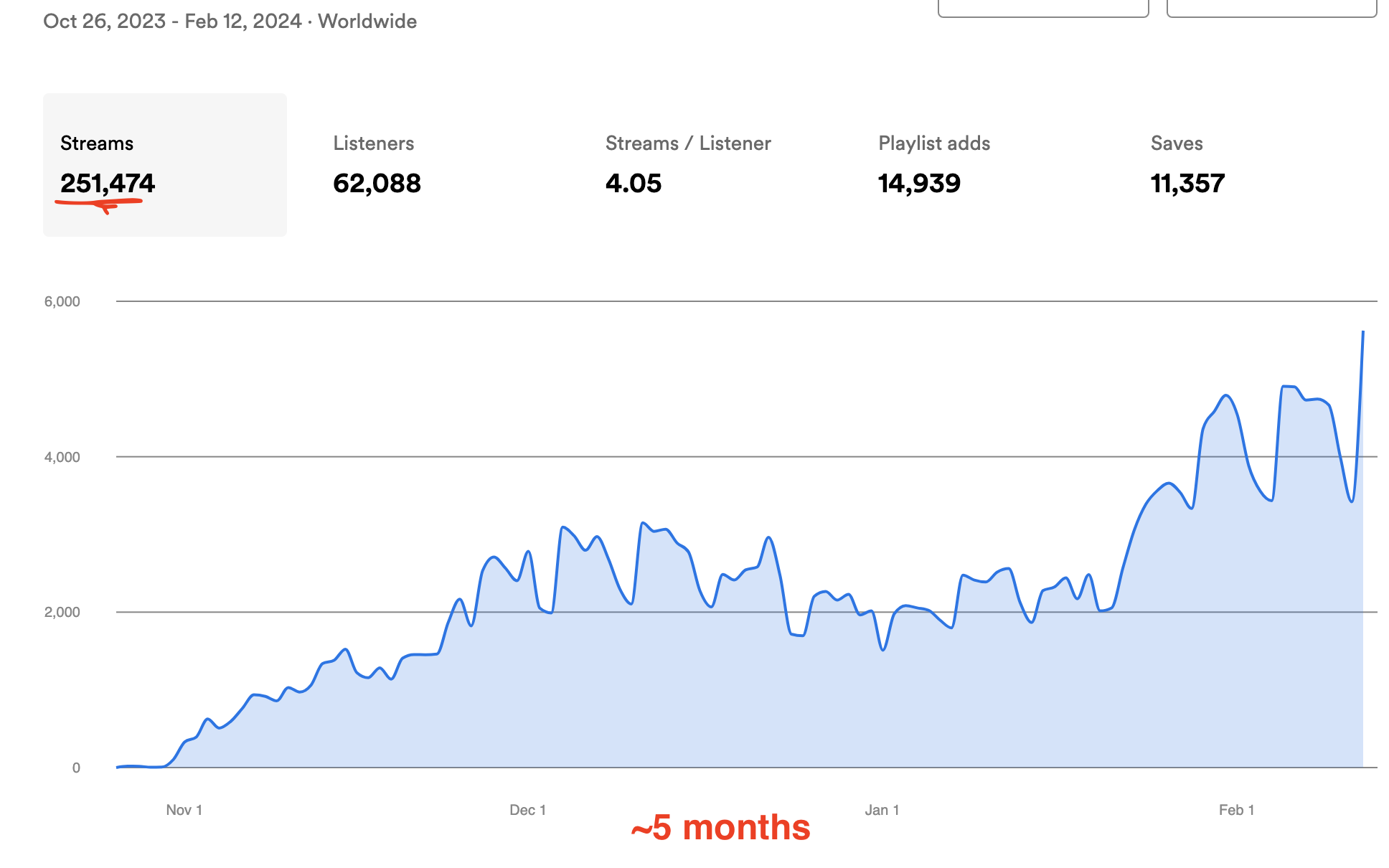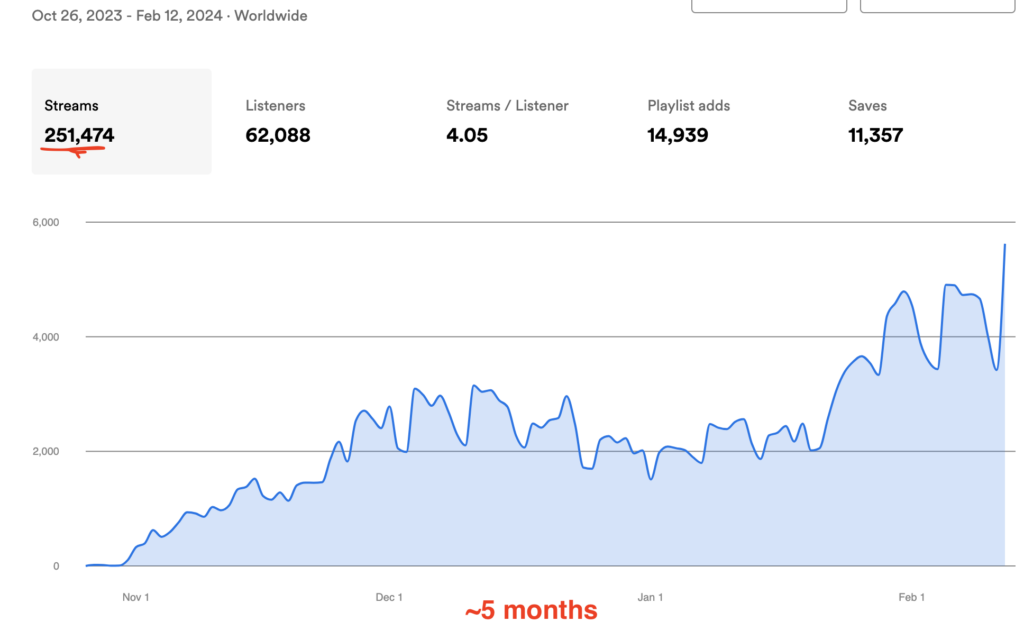The quick synopsis of my seven-step process:
- Make a list of blogs to submit to
- Put together your press kit
- Email editors to ask for coverage
- Follow up on your emails
- Use SubmitHub
- Maybe use MusoSoup
- Don’t give up
Read on for the details.
There’s nothing more exciting than getting ready for an album release.
Months of preparation, recording sessions, countless hours listening to mixes and masters, and choosing the design and packaging. The whole process brought to life a piece of work uniquely yours and ready to be published worldwide.
Every day we hear stories of artists who achieved success overnight. We hear of albums that required little promotion and artists pushed by vibrant, ultra-democratic digital communities that acted as echo chambers and skyrocketed them to stardom.
I, on the other hand, have a completely different story to tell. As a record label owner and artist, I went through so many marketing failures and ineffective social media campaigns that it still stings to write about it. For me, to release an album of an artist I truly believe in and see it getting no coverage or being largely ignored is heart-breaking.
I learned the hard way that, no matter how good your music is, if your marketing strategy is flawed, people won’t know it exists. Today, musicians are often the producers, audio engineers, marketing managers and PR agency of themselves; in this context, the importance of pragmatism and persistency become even more crucial for your artistic career.
There’s no perfect formula for music marketing promotion, in the same way as there’s no easy path to fame.
The overnight success is often preceded by many sleepless nights: only practice, dedication, and passion can bring results in the long run. There’s no way around it.
For the last twenty years, music blogs have been one of the most fundamental sources of inspiration for musicians and audiophiles. The dedication of these music writers, combined with the versatility of the blog format, allowed the best music blogs to gather thousands of followers eager to listen to upcoming publications.
Most music bloggers receive dozens of submissions every day, and most of them are ignored simply because there’s no time to go through all of them. Those that are taken into consideration are the ones that can catch the attention of the writers: it can be the album excerpt, the press release, or the email you sent them that captivates them. Because of all these factors involved, each element of your email must be carefully-tailored and personal.
Today I want to focus on the marketing strategy I developed over the years when contacting music blogs. Although no strategy can guarantee success, there are some crucial steps you need to be aware of if you want bloggers to take you seriously.
With all of that said, let’s get to it: Here’s how to submit to music blogs in 2022.
1. Make a list of blogs that you like and that cover your genre of music.
Creating a list of the music blogs you want to contact is the first crucial step you must take if you’re going to get your music heard. If you’re passionate about the music you make, I’m sure you can think of two or three blogs you like and regularly check out for inspiration.
Create a spreadsheet and start adding the names and links to the music blogs you like the most that are in line with your genre. Make sure you include their contact details and, if possible, the name of the person who might review or upcoming album.
Compiling a list of music blogs is an ongoing process that requires regular updates and monitoring. Music blogs come and go, and many times I found myself trying to email blogs that didn’t exist anymore. So make sure you check these blogs regularly.
This list may become one of the most powerful tools you’ll have at your disposal when releasing new music, so make sure you use it wisely. Don’t overwhelm bloggers with a plethora of emails, and make sure the list is in line with the genre you’re releasing or promoting. Asking a writer who doesn’t cover your music genre to listen to your tracks is a waste of time for everyone.
2. Create a press kit (also called an EPK).
You have no idea how many times artists ask me why we’re wasting time writing a press release. So let me take this opportunity to reiterate the importance of an EPK or Electronic Press Kit:
- A press kit makes you look professional.
- If the writer wants to review your album but has little time, it’ll draw inspiration from your press release instead of not writing about it at all.
- You tell reviewers about your background, what inspired your upcoming release, and who was involved in the album’s production.
- You can add pictures that can be used for the review.
- Your contact details and social media pages will be there.
Actually, I should have stopped at the first point. Even if it’s your debut album and you have zero experience in the music industry, looking and sounding professional will encourage music bloggers to invest their time in highlighting your creative output. Hidden, raw gems are beautiful and inspiring but also an exception.
What should you include in your EPK? Everything a blogger needs to know in order to present you to their audience in the best possible way: your story, the album’s background, audio/video material, and how people can find out more about you if they’re interested in what you do.
Invest some time in making an aesthetically-pleasant presentation, and make sure you don’t overwhelm them with information that’s not necessary for the purpose of the article. In my experience, a press release shouldn’t be longer than two pages, but it’ll also depend on how many pictures you include in it.
3. Write a kind, personal email to the editor, asking for coverage.
Personal experience here.
A few years ago, I delegated to an assistant of mine to send a hundred emails to music blogs about an album we were about to publish. We didn’t receive a single response after one week. We sent a follow up shortly after, but still, radio silence. Finally, after two weeks, I checked the first email we sent and found out my assistant used the same opening line for all the emails: “Dear Richard, and the team of (blog name)”, using the same blog name for all the messages.
No one likes mass-targeted emails, and as soon as bloggers find out you’re emailing them together with dozens of other music blogs, they’ll ignore you, most likely. The only way to avoid this is to put some effort and tailor your email to the blog you’re contacting.
This is, in my opinion, the most crucial factor that defines whether an album gets reviewed or not. Blogging is often a labour of love: what music writers want is to be appreciated for their work, so start by praising their website, reading some of their reviews, and becoming familiar with their style.
Next, try to find the names of the people running the music blog and include their names in the email. Write a few words about their music blog, and mention a review or an artist they covered recently; it’ll show them you’re contacting them because you know your music is in line with what they cover.
Be nice and concise.
Time is limited, so I’d recommend you divide your email into four parts:
Email introduction
Here’s where you say who you are and show that you’re familiar with their output. You should sound professional but relaxed: you’re not contacting a financial institution.
Use these three sentences to catch their attention by showing appreciation for what they do, or simply by being a nice human being who took the time to personalise an email before sending it out.
The reason why you’re emailing them
For example, you’re contacting them because you have an album coming out in a couple of months, and you think your music is in line with the musical genres they cover usually.
Describe your sound, give a few references (which musicians or albums inspired you the most), and keep it simple and catchy. If they read this far, you need to use this paragraph to intrigue them and make them want to find out more about you and your music.
What they can do for you
Most likely, they already know you want to be reviewed, but there’s no harm in clarifying what you’re expecting from them. Tell them you’d be honoured to have your music reviewed in a blog that’s a source of inspiration for so many people worldwide. Be honest and direct with them: you need them more than they need you.
Contact details/Marketing material
Here you should add a link to the press release to your website and social media pages. I suggest you keep the email as short as possible and add everything else in the EPK and on your website so that they can go through your marketing material only if they’re interested in writing about your album.
Thank them for what they do. They deserve it.
4. Follow up on your emails.
So despite spending the whole weekend writing an email template that your partner had to read out loud multiple times, no one replied to your request a week after you sent it? Let’s take a look at what could cause it.
On average, most music blogs review between 3 to 5% of the music they receive, so if you sent a hundred emails, you should get reviewed by at least three music blogs. However, if you’re not targeting the right blogs, you might not get any reviews at all.
They might be very busy. This happens often, so don’t panic if you don’t get any response. One album published under my label in 2018 was reviewed by an important music magazine in 2020. The explanation was that, during the first pandemic lockdown, the music writer finally had time to catch up with old releases.
Either way, if you don’t receive a response after a couple of weeks, you should send a follow-up. Simply reply to the first email you sent them and say something along the line of “I just wanted to make sure you saw my previous email. I look forward to hearing from you”.
Once again, make it personal but keep it short and straight to the point. They might get back to you and apologise for the delay or simply ignore it again.
Two emails are enough. If they don’t get back to you after the second email, it means they’re either not interested or not in the condition to review your album anytime soon. Just leave it like that and move on to more engaged music blogs.
5. Use SubmitHub to get supplemental coverage.
If you’ve released music over the last few years, I’m sure you’re familiar with SubmitHub, the platform that allows you to submit your music to like-minded music bloggers and curators automatically. (We actually reviewed it in pretty good detail here.)
This is a fantastic option if you’re looking for an effective way to get your music to bloggers and tastemakers. All you have to do is upload your music to the platform, give as much information as you can about yourself and your release, and send it to the writers interested in your genre.
Sounds easy, right? Well, the tastemakers you’ll find here on SubmitHub receive thousands of tracks every day, which means it’ll be hard for you to get noticed if you’re just at the beginning of your career.
A way around this problem is by purchasing premium credits. Essentially, you can contact music curators by either using standard credits (free) or premium credits, which cost less than $1 per credit, and you can buy a bunch of them for a discount.
If you opt for premium credits, music curators will have to listen to your submission and give you an answer, regardless of whether they decide or not to review your album; otherwise, you’ll get a refund.
In my opinion, SubmitHub is a good marketing tool that can help you get more visibility; However, I’ve never been amazed by the coverage I received from the curators on this platform. Aside from using SubmitHub, I suggest creating your own personal contact list and emailing them directly.
6. Maybe use MusoSoup, too.
MusoSoup is a good alternative to SubmitHub that allows you to create cost-effective marketing campaigns and reach bloggers, tastemakers and playlist creators worldwide.
After uploading your music on MisoSoup, they’ll have 45 days to accept or reject your music. If they do accept it, they’ll run a tailored marketing campaign that will help you get your music out there.
Compared to SubmitHub, MusoSoup’s team feels more passionate and dedicated to artists’ promotion, although even here, results may vary depending on your music genre and how many followers you already have. Either way, I suggest you give it a try if you have a release coming up.
Final thoughts on submitting to music blogs
I hope this article helped clarify the necessary steps to get your music out there. I’ll conclude this piece with a personal thought.
The best marketing strategies require multiple approaches and must be personalised.
For example, you should ideally use SubmitHub and contact music blogs directly. Even though the more people you contact, the higher the chances of getting covered, bear in mind that most of these tastemakers do this for fun, so make sure you treat them respectfully even if they don’t get back to you.
You should consider what music bloggers want if you’re contacting music blogs directly. A music blogger’s objective is to promote high-quality music that resonates with them and their audience.
Your communication with them should be based on mutual appreciation and respect. Therefore, take some time to sound friendly, professional, and personal. In this way, you can create a long-term collaboration that will benefit both of you greatly.
Good luck, and stay creative!








